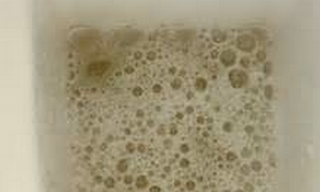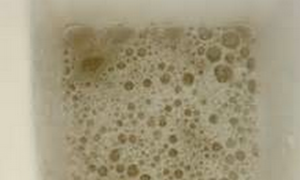Frothy urine can be caused due to mild causes or as a symptom of some severe underlying disorder. Some of the common causes of frothy urine are listed below.
Causes of frothy urine
Frothy urine may occur due to the following causes:
- Proteinuria: The condition of excess amounts of protein in urine is known as proteinuria. Normal urine usually has trace amounts of protein in it. However, excess protein content in urine is abnormal. Increased protein in urine is typically caused due to intake of a protein rich diet consisting of meat, chicken, fish, etc. It can also occur due to intake of increased amounts of protein supplements. Such excess protein is not absorbed into the body and instead eliminated along with urine. Protein released along with urine acts with the atmospheric air and causes frothy urine.
- Kidney problems is a severe cause of proteinuria. The glomeruli of the kidneys are responsible for filtration and regulation of protein in urine. Any kind of damage, infection, or inflammation of the glomeruli can adversely affect this function and cause excess protein in urine.
- Additional symptoms of proteinuria include swelling of the face, limbs, etc.
- Changes in diet and reducing the intake of protein supplements can help decrease protein in urine. Frothy urine caused by kidney issues need to be checked by a doctor and treated as per standard medical procedures.
- UTI/Urinary Tract Infection: The urinary system is made up of the ureters, bladder, kidneys, and the urethra. Infection of the urinary system by bacteria or other pathogens is known as a UTI. Such microorganisms may enter the urinary tract via the urethra or through the bloodstream. It is these pathogens that cause the urine to become frothy. Additional symptoms include burning sensations when passing urine, increased urination, etc. The condition is treated with antibiotics and other medications as well as maintaining personal hygiene and lifestyle changes.
- Kidney Diseases: As discussed above, kidneys are responsible for filtering urine and other important functions. Hence, any kind of kidney disease, infection, or damage can adversely affect its functions. Most kidney problems-associated frothy urine cases are caused due to release of excess protein in urine. Diabetes and kidney stones, etc., are also known to cause frothy, smelly urine. Additional symptoms of kidney conditions include loss of appetite, pain in flanks, appetite loss, lethargy, fatigue, hypertension, frequent urination, painful urination, etc. Consult a doctor for treatment options; kidney stones may require surgical intervention.
- Minor dehydration: Deficient intake of water and other fluids can result in the production of excessively concentrated urine which in turn is eliminated as frothy urine. Additional symptoms of mild dehydration include headache, exhaustion, low urine output, and dry mouth, etc. Drink lots of water and other liquids to rehydrate the body and treat and prevent dehydration and frothy urine.
- In diabetics, excess blood sugar is removed via urine, causing the patient to urinate frequently and thus suffer from dehydration. Diabetics who observe excessive thirst, increased urination, and frothy urine need to check their blood glucose levels and immediately seek medical attention.
- Pregnancy: In additional to hormonal changes, the body undergoes a variety of changes during pregnancy. Pregnant women may suffer from frothy urine if they do not drink sufficient water or fluids; and protein in urine due to varied causes including enlargement of the kidneys, thereby making the glomeruli more permeable leading to release of excess protein in urine. Proteinuria can also be a symptom of a far more serious condition called preeclampsia; the condition is marked by high blood pressure and edema or swelling of hands, legs, and face. Pregnant women need to go for regular checkups and immediately seek medical attention when suffering from proteinuria or hypertension.
- Vesicocolic fistula: It is a condition characterized by an anomalous connection between the urinary bladder and the colon. The base section of the bladder develops a swelling or an edema and fluid begins accumulating under the skin surface. Such fluid gets eliminated along with urine causing frothy urine. Vesicocolic fistula typically affects more men than women. Even though the condition is mild, it can sometimes be a symptom of more severe disorders like Crohn’s disease, tumors, etc. Consult a doctor for appropriate diagnosis and treatment.
- Forceful passing of urine: It is a mild and temporary cause of frothy urine. Delay in passing urine can cause excessive buildup of urine in the bladder. Finally, when such urine is eliminated from the body, it is done so with increased force so as to find relief. When such rapidly released urine hits the water in the toilet bowl, it causes the eliminated urine to become frothy or foamy.
- Other causes: Frothy urine may also be caused due to:
- Excess semen in urine due to retrograde ejaculation
- Reaction between urine and the toilet cleaners used for cleaning the toilet bowl.
- Dehydration during the first few days of menstruation.


